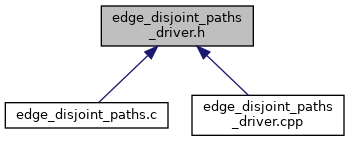 |
PGROUTING
3.2
|
 |
PGROUTING
3.2
|
#include <stddef.h>#include "c_types/pgr_edge_t.h"#include "c_types/pgr_combination_t.h"#include "c_types/general_path_element_t.h"

Go to the source code of this file.
Functions | |
| void | do_pgr_edge_disjoint_paths (pgr_edge_t *data_edges, size_t total_tuples, pgr_combination_t *combinations, size_t total_combinations, int64_t *source_vertices, size_t size_source_verticesArr, int64_t *sink_vertices, size_t size_sink_verticesArr, bool directed, General_path_element_t **return_tuples, size_t *return_count, char **log_msg, char **notice_msg, char **err_msg) |
| void do_pgr_edge_disjoint_paths | ( | pgr_edge_t * | data_edges, |
| size_t | total_tuples, | ||
| pgr_combination_t * | combinations, | ||
| size_t | total_combinations, | ||
| int64_t * | source_vertices, | ||
| size_t | size_source_verticesArr, | ||
| int64_t * | sink_vertices, | ||
| size_t | size_sink_verticesArr, | ||
| bool | directed, | ||
| General_path_element_t ** | return_tuples, | ||
| size_t * | return_count, | ||
| char ** | log_msg, | ||
| char ** | notice_msg, | ||
| char ** | err_msg | ||
| ) |
Definition at line 66 of file edge_disjoint_paths_driver.cpp.
References General_path_element_t::agg_cost, pgassert, pgr_alloc(), pgr_free(), pgr_msg(), single_execution(), and AssertFailedException::what().
Referenced by process().